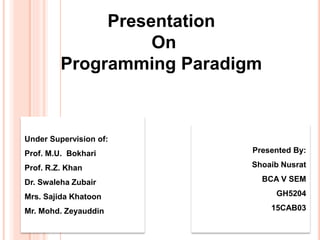
Programming paradigm
- 1. Presentation On Programming Paradigm Presented By: Shoaib Nusrat BCA V SEM GH5204 15CAB03 Under Supervision of: Prof. M.U. Bokhari Prof. R.Z. Khan Dr. Swaleha Zubair Mrs. Sajida Khatoon Mr. Mohd. Zeyauddin
- 2. CONTENT Introduction History Imperative Programming Paradigm Declarative Programming Paradigm Functional Programming Paradigm Object Oriented Programming Paradigm Multi-Paradigm A glance of different Paradigms Conclusion References
- 3. INTRODUCTION What is programming paradigm ? A programming paradigm is a fundamental style of computer programming. Paradigms differ in the concepts and methods used to represent the elements of a program (such as objects, functions, variables, constraints). And also steps that comprise a computation (such as assignations, evaluation, continuations, data flows).
- 4. HISTORY Different approaches to programming have developed over time. The concept of a "programming paradigm" as such dates at least to 1978. The lowest-level programming paradigms are machine code. In the 1960s, assembly languages were developed followed by development of procedural languages. Following the widespread use of procedural languages, object-oriented programming (OOP) languages were created and followed by many more…
- 5. IMPERATIVE PROGRAMMING PARADIGM Imperative programming is a programming paradigm that uses statements that change a program's state. In much the same way that the imperative mood in natural languages expresses commands. An imperative program consists of commands for the computer to perform. Imperative programs describe the details of HOW the results are to be obtained. HOW means describing the Inputs and describing how the Outputs are produced. Examples are: C, C++, Java, PHP, Python, Ruby etc.
- 6. DECLARATIVE PROGRAMMING PARADIGM Declarative programming is a programming paradigm—a style of building the structure and elements of computer programs—that expresses the logic of a computation without describing its control flow. Declarative programming focuses on what the program should accomplish. Declarative programming often considers programs as theories of a formal logic, and computations as deductions in that logic space. Examples are: SQL, XSQL (XMLSQL) etc.
- 7. FUNCTIONAL PROGRAMMING PARADIGM Functional programming is a subset of declarative programming. Programs written using this paradigm use functions, blocks of code intended to behave like mathematical functions. Functional languages discourage changes in the value of variables through assignment, making a great deal of use of recursion instead. Examples are : F#, Haskell, Lisp, Python, Ruby, JavaScript etc.
- 8. OBJECT ORIENTED PROGRAMMING PARADIGM Object-oriented programming (OOP) is a programming paradigm based on the concept of "objects", which may contain data, in the form of fields, often known as attributes; and code, in the form of procedures, often known as methods. There is significant diversity of OOP languages, but the most popular ones are class-based, meaning that objects are instances of classes, which typically also determine their type. In OOP, computer programs are designed by making them out of objects. Examples are: C++, C#, Java, PHP, Python.
- 9. MULTI PARADIGM A multi-paradigm programming language is a programming language that supports more than one programming paradigm. The design goal of such languages is to allow programmers to use the most suitable programming style and associated language constructs for a given job. Languages such as C++, Java, Python are multi- paradigm programming languages that support object-oriented programming to a greater or lesser degree, typically in combination with imperative, procedural programming.
- 10. Paradigm Description Examples Imperative Programs as statements that directly change computed state (datafields). C, C++, Java, PHP, Python, Ruby. Functional Treats computation as the evaluation of mathematical functions avoiding state. C++, Lisp, Python, JavaS cript Object-oriented Treats datafields as object s manipulated through predefined methods only C++, C#., Java, PHP, Python . Declarative Defines program logic, but not detailed control flow SQL, CSS. A Glance of different paradigms
- 11. CONCLUSION There is still not a consensus (and probably there will never be) on a programming paradigm and a programming language is most suitable. All approaches have their advantages and disadvantages, with many supporting arguments and Case-studies. Despite that, it seems that nowadays the most popular paradigms for introductory courses are the procedural, with programming language C and procedural part of C++, the object-oriented, with languages Java and C++.
- 14. Thanks